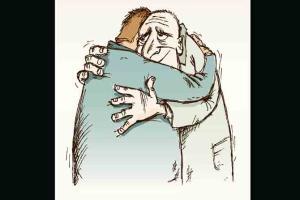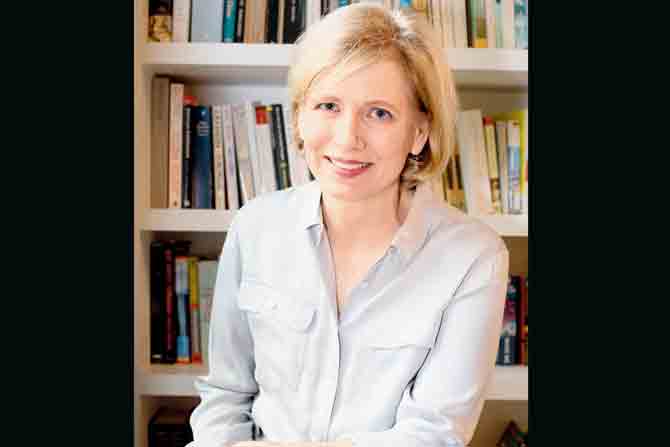A science journalist, who has spent years researching the chemistry between friends, is out with a new book that reminds us why we need our bum chums, especially now

How did you know I was the one?" It's a question I've asked my best friend often over the 16 years I have known her. "It was your long, black hair… that's what I noticed when you walked into class the first time," she remembers. "Also, your name. I couldn't get it out of my head."
As an afterthought, she thinks it would have made for a beautiful story, were it a romantic one. "It's sad that momentous or serendipitous beginnings are not given importance, when it comes to friendship," she rues.
ADVERTISEMENT
US-based science journalist Lydia Denworth has been invested in a similar enquiry for the longest time. "I was surprised to discover how little we know about friendship and to realise how much we take it for granted," she says in an email interview.
It is one of the reasons she wrote, Friendship: The Evolution, Biology, and Extraordinary Power of Life's Fundamental Bond (Bloomsbury). Here, Denworth goes back to the drawing board, to understand the "hows and whys" of people seeking meaningful connections with those outside their immediate families.
"I found that neuroscientists and evolutionary biologists and other scientists you don't immediately associate with friendship were taking it very seriously," says Denworth, who is the contributing editor for Scientific American, and writes the Brain Waves blog for Psychology Today. "They are treating friendship with new respect. I am trying to do the same in my own life. Fortunately, I don't feel like friendship is just another thing on my to-do list. Instead, I feel that the new science of friendship gives us permission to prioritise hanging out with our friends. It's good for us."
Edited excerpts from the interview
To understand the biology of friendship, scientists have been studying the relationship between monkeys. Why so?
Animals have much to teach us about ourselves. The discovery of friendship or something like it in other species reveals that it not just a product of human culture, as was long assumed. Instead, friendship is part of a larger evolutionary story. For instance, studies show that baboons with the strongest social bonds live longer and have more and healthier babies, and that people who are strongly socially integrated are healthier and live longer. There are real evolutionary advantages to
being able to make and maintain friends.
Why has the island of Cayo Santiago [close to the east coast of Puerto Rico] aroused interest among scientists, researchers and writers like yourself?
I was fascinated by the monkeys who live on Cayo Santiago and thought readers would be, too. Cayo is uniquely set up to allow scientists to observe social behaviour in a detailed way. The researchers are like exacting gossip columnists, who track who does what to whom, and what it gets them in the long term. For my purposes, the work being done there was a perfect example of how scientists are thinking about friendship in a new way. It turns out that the behaviour of a monkey relates to why you want to call your girlfriend when you need a good cry, or why boys playing videogames together might be getting in more quality social time than their parents imagine.
What, according to you, draws two people to become friends?
Friendship has a chemistry to it, like romance. There are some people we like from the minute we meet them. Proximity and similarity, especially when it comes to a shared world view, are part of it, but it's possible to befriend people who are very different from you or those you don't get to see very often. To become friends, you need to put in time to know each other and develop trust and closeness.
You've explained in the book that people associate little value with friendship. Were you to compare friendship with family bonds or romantic relationships, where would it stand?
Family and romantic bonds are important, of course, but friendship is right up there as an essential relationship. Too often, we put it last. I think we may have got prioritising relationships wrong. We rate them based on blood and law, not quality. We ditch our friends when we fall in love and ignore them when we're busy. Yet, the science of friendship says quality relationships that are stable, positive and cooperative have the most impact on our health and longevity. Good friends consistently meet that definition. Family and romantic partners sometimes do, and, alas, sometimes don't. When they do, we can consider them friends too.
How can the quality of social bonds, especially friendship, impact the individual?
Friendship is as important for our health as diet and exercise. It impacts cardiovascular and immune function, cognitive and mental health, stress responses and even the rate at which our body cells age. Those suffering from loneliness are more likely to die [earlier]than people who are socially integrated.
You write about how it's so easy to ditch or distance a friend. But, that's how we've come to understand this relationship, as one that is transient and not permanent. Do you find this approach problematic?
I do. The most straightforward definition of friendship that has emerged from the science is that it is a relationship that is long-lasting, positive and cooperative. In other words, a friend should be a reliable presence, should make us feel good and should be there to help when needed. While it's true that some friends come and go through our lives—maybe we move or just grow apart, and that's okay—we should strive to maintain a couple of strong bonds with people we can count on.
Is there really a formula to find true friendship? We watch out for signs, when we are in love. What does one watch out for when looking for a friend?
A friendship should be reciprocal, meaning that the warmth of feeling is shared and that you take turns helping each other when necessary. A relationship that is too lopsided—all take and no give—may not stand the test of time.

Journalist-author Lydia Denworth says that the new science of friendship gives us "permission to prioritise hanging out with our friends". Pic courtesy/ Jessica Barthel
In the book, you talk about how when you moved to Hong Kong briefly, not having friends affected you enough for you to have felt the desperate need to bond. The need to connect is intrinsic, yet when we get fiercely attached to a friend, we are labelled needy.
Loneliness acts like a physiological warning signal. It drives us to connect in the same way that hunger drives us to eat. That's a good thing, but loneliness can also make us feel threatened, which we sometimes experience as desperation. Our social skills suffer as a result.
But there is hope. Recognising the pattern can help us self-correct.
Do you have an interesting and deep friendship story that you came across, while researching for the book?
I mention my friend Dan in the book. When he was growing up, he had a tight group of male friends. They are all in their 40s now and are still very close. That might have happened anyway, but in their case, when they were all just out of college, two of the men (brothers) lost their father in the World Trade Center attacks on September 11, 2001. While talking to several of them about it while I was reporting, I sensed that helping each other through that tragedy cemented their bond in adulthood.
When lovers break up, or close family members die, it affects our psychological and emotional well-being. We have rarely heard of a similar reaction to the sudden abandonment of a friend. Why is that?
Actually, there are many people who are deeply affected by the loss of a friend. Several memoirs have been written on the subject. Interestingly, one way that psychologists studied people's close relationships was to ask them to name the people without whom they could not imagine life. In their answers, people named family members, but they also often named friends. I suspect the reason you think that's not true is that we have many friendships of varying intensity. You're not going to feel the same way about the death of a family member versus someone who is a more
casual friend.
How is a friendless individual different from someone, who has friends?
I can say that some people are far more introverted than others and prefer to spend a lot of time alone. In fact, almost everyone enjoys some time alone. But even introverts usually have a few friends. From a health perspective, what matters most is having even one friend. The difference between zero and one is huge. There are lots of different ways to do friendship. I'm not arguing that everyone needs to be the life of the party. I'm showing through the book that feeling socially connected to others is good for your health and longevity.
In times of social isolation, we feel the need for friends. Do you think, human beings will come out of this, feeling more connected?
I think this crisis has reminded us not to take friendship for granted. Absence is making the heart grow fonder, so to speak. I hope that when this is all over, we don't go back to our old ways. When it's safe to do so, we should fall into our friends' arms with joy and then make a date to get together again. And not cancel.
Catch up on all the latest Mumbai news, crime news, current affairs, and a complete guide from food to things to do and events across Mumbai. Also download the new mid-day Android and iOS apps to get latest updates.
Mid-Day is now on Telegram. Click here to join our channel (@middayinfomedialtd) and stay updated with the latest news
 Subscribe today by clicking the link and stay updated with the latest news!" Click here!
Subscribe today by clicking the link and stay updated with the latest news!" Click here!







